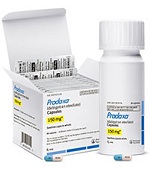 |
It turns out that Boehringer Ingelheim's popular anticoagulant Pradaxa is safer than many people think. That is the finding of the FDA after taking another look at the side effects of the drug compared to the old standard warfarin and this time looking at a much larger and older patient base.
In a MedWatch announcement late Tuesday, the FDA said that its deep dive into reported events not only looked at more records but also used "a more sophisticated analytical method." And what did the FDA find? It said that among new users of blood-thinning drugs, Pradaxa has a lower risk of clot-related strokes, bleeding in the brain, and death than warfarin. However, the risk of major gastrointestinal bleeding was higher, while the MI risk of the two drugs was about the same.
In an emailed statement, Dr. Sabine Luik, senior VP, medicine and regulatory affairs, at Boehringer Ingelheim, said the FDA findings were consistent with those reported in its pivotal RE-LY trial, the study used to seek FDA approval. "These findings are particularly notable given the study used a sophisticated analytical method to capture and analyze events and was based on a much larger and older population than analyzed before--134,000 Medicare patients, 65 years and older with atrial fibrillation who were new users of anticoagulants."
The sometimes-fatal bleeding risk of Pradaxa has been a concern to the FDA since the drug was approved in 2010, and in January the agency said it would do another review. Earlier FDA and clinical reviews have not found the chances of bleeding to be any greater for the Boehringer Ingelheim drug than for warfarin, but it continues to top the list for adverse reaction reports. But so does warfarin, and while it comes with an antidote against bleeding, it is difficult to dose and requires ongoing monitoring.
That is why new anticoagulants like Pradaxa, Xarelto from Bayer and Johnson & Johnson ($JNJ) and Eliquis from Pfizer ($PFE) and Bristol-Myers Squibb ($BMY) have been so popular among doctors. In fact, the World Preview report last year from Evaluate Pharma predicted that the market for anticoagulant drugs will expand by 11.5% annually through 2018, hitting $15.3 billion in sales. That makes it the fastest growing therapeutic area. Sales of Pradaxa last year increased by nearly 9% in euro terms to hit €1.2 billion ($1.645 billion), according to Boehringer.
- here's the FDA MedWatch announcement